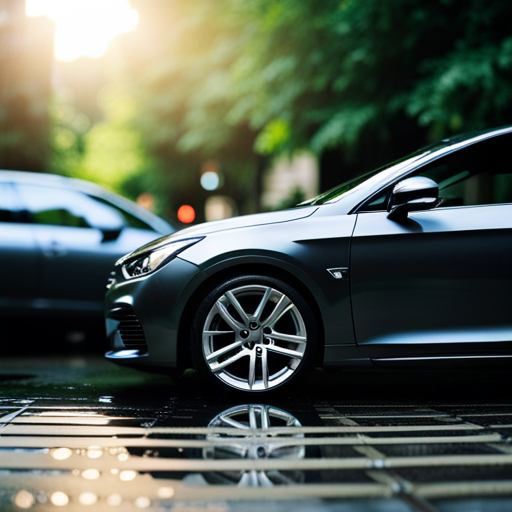Hard water spots can be a major problem for car owners, causing unsightly and potentially damaging white spots on the vehicle’s paint job. These spots are caused by the evaporation of calcium-rich tap water, which leaves behind a residue that can ruin the appearance of the car and lead to further damage over time.
Fortunately, there are several preventative measures that can be taken to avoid hard water spots and maintain a spot-free shine.
In this article, we will explore the causes of water spots on cars, the effects of hard water on a vehicle’s paint job, and provide tips for preventing and removing water spots. By following these tips and taking a proactive approach to car maintenance, you can keep your vehicle looking its best and avoid costly damage caused by hard water spots.
Whether you are a seasoned car enthusiast or a casual driver, this article will provide valuable insights into preventing and addressing hard water spots on cars.
Key Takeaways
– Hard water spots on cars can ruin the paint job and cause damage to the clear coat and eventual rust damage.
– Thoroughly drying and buffing the vehicle after washing is the simplest way to prevent hard water spots.
– Washing a car by hand with lower water pressure and using softened or distilled water can guarantee a streak-free and spot-free shine.
– Hard water can also cause damage to other household items such as faucets, dishes, and shower doors.
Causes of Water Spots
The formation of hard water spots on cars is attributed to the evaporation of calcium-rich tap water, which leaves a white film of calcium behind. As the water evaporates, the minerals in the water are left behind and can cause damage to the clear coat. This mineral buildup can also eventually expose the car to rust damage.
Removing hard water spots is essential to maintain the beauty and integrity of a car’s paint job. DIY water softening solutions can be used to prevent hard water spots from forming. Softened or distilled water can be used to hand-wash a car, and a garden hose water softener can be used to soften water for use on a vehicle.
By incorporating these solutions, one can ensure that their car stays looking shiny and new for longer.
Prevention Tips
Thoroughly drying and buffing the vehicle after washing can significantly reduce the appearance of calcium deposits on the surface of a car. This is the simplest and most effective way to prevent hard water spots from forming. The use of a microfiber cloth or buffing pad can help to dry the vehicle uniformly and prevent streaks.
Additionally, it is important to remove any dust or pollen from the surface of the car before washing, as this can contribute to the formation of water spots.
In addition to drying and buffing, there are other preventative measures that can be taken to avoid hard water spots on cars. Some of the best products for preventing water spots include ceramic coatings and sealants, which provide a protective barrier against mineral deposits.
DIY techniques such as using a water softener or distilled water for washing can also be effective in eliminating calcium deposits. By taking these precautions, it is possible to maintain a beautiful and spot-free finish on a vehicle.
Effects of Hard Water
Calcium-rich tap water can cause damage to a vehicle’s clear coat and expose it to eventual rust damage. This is because hard water contains minerals such as calcium and magnesium that can leave behind stubborn mineral deposits as the water evaporates. These deposits can cause damage to the clear coat and paint job of a car, leading to unsightly hard water spots.
Beyond car care, hard water can also have negative effects on household plumbing and appliances. Common sources of hard water in homes include well water, municipal water supplies, and water that has been treated with a water softener system that has failed or is not installed.
To prevent the negative impact of hard water on plumbing and appliances, several solutions are available. One solution is to install a water softener system in the home. This system works by removing minerals from the water supply, preventing the buildup of mineral deposits in plumbing and appliances.
Another solution is to use products designed to combat hard water, such as soaps and detergents that are specifically formulated to work in hard water. Ultimately, preventing hard water damage requires taking proactive steps to address the issue, whether through installing a water softener system or taking care of appliances and plumbing with appropriate cleaning and maintenance.
Conclusion
In conclusion, hard water spots on cars can be a frustrating and unsightly problem that can eventually lead to damage if not properly addressed. Understanding the causes of water spots and taking preventative measures can help car owners maintain a spot-free, streak-free shine.
Some effective prevention tips include:
– using a water softener or filtration system
– washing the car regularly
– avoiding parking under sprinklers or in areas with hard water
– using a wax or sealant to protect the paint job
It is important to note that hard water spots can cause damage to the car’s clear coat and lead to rust if left untreated. Therefore, taking preventative measures and addressing water spots as soon as they appear is crucial for maintaining the overall look and health of your car.
